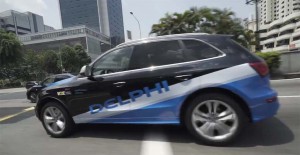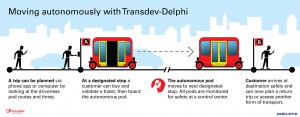
Delphi's a leader in autonomous vehicle technology, but now looks to partner with Transdev to be THE leader.
They may not be household names like Google, General Motors or Tesla, but automotive supplier Delphi and mobility technology firm Transdev are joining forces in a project that could position them at the head of the line in efforts to bring autonomous driving systems to the real world.
The two companies announced Wednesday that they are teaming up to start testing a driverless “mobility-on-demand” service in two parts of France beginning late this year. If the pilot programs in Paris and Normandy prove successful, the partners plan to launch commercial service by 2019.
“We believe that autonomy will bring a lot of social benefits,” said Yann Leriche, chief performance officer of Transdev, during a conference call with reporters. “Our mission is to leverage those benefits to provide attractive shared transportation options to our clients. The asset can be shared, for example on-demand cars, or the ride can be shared, for example, buses.”
Dozens of automakers and suppliers, tech firms and other companies have entered the autonomous vehicle arena, with a number of them hoping to have their first efforts in commercial operation by decade’s end. Most are focusing on hands-free passenger cars, with longer-term efforts focused on vehicles that could eliminate the driver entirely.
(Delphi looking to get Intel inside its autonomous technology. Click Here for the story.)
The Delphi-Transdev system takes a somewhat different approach. The new joint venture is working on driverless vehicles that would operate as a blend of shuttle bus and taxi.
- In parts, the first pilot program will target first-mile/last-mile needs, providing transportation from a railway station and a campus in the suburb of Sarclay. There will be three vehicles initially and will grow as the partners shake out any possible bugs;
- The second project, in Normandy, will operate like a shuttle bus, with designated pick-up and drop-off points but, like ride-sharing services Uber or Lyft, a passenger will schedule the pick-up using a smartphone app.
Initially, back-up drivers will ride the vehicles, ready to take over if a problem develops, but the partners intend to go completely driverless as soon as possible.
(Click Here to see why the “passenger economy” will grow to $7 trillion by 2050.)
If the project works as planned, it will provide, “a clear path to commercializing automated mobility on demand,” said Glen De Vos, Delphi’s chief technology officer, during the media briefing. The service would expand in the two cities as the partners look for new opportunities in Europe and other parts of the world.
Delphi is one of the world’s largest automotive suppliers. It originally was formed as a spin-off from General Motors focusing on traditional parts and components manufacturing. In recent years, it spun off many of those old-line units, shifting focus to high-technology fields.
Delphi already has announced a partnership with Mobileye, the Israeli-based provider of in-vehicle camera systems used in many prototype autonomous vehicles. The alliance with Transdev takes it significantly deeper into the emerging world of autonomous technology and could put it up as a key challenger to the likes of Waymo, the Google spin-off that is testing an autonomous ride-sharing service in Phoenix.
For its part, Transdev is a major player in mobility network operations, working on public transit systems including buses, light rail and ferries. It employs 83,000 and runs 40,000 vehicles in 19 countries in five continents.
(To see why investors betting big on autonomous technology, Click Here.)
French automaker Renault will provide two Zoe electric vehicles for the Normandy project. A shuttle bus will be used in Paris. Other types of vehicles may eventually be added to the venture, the partners said.

